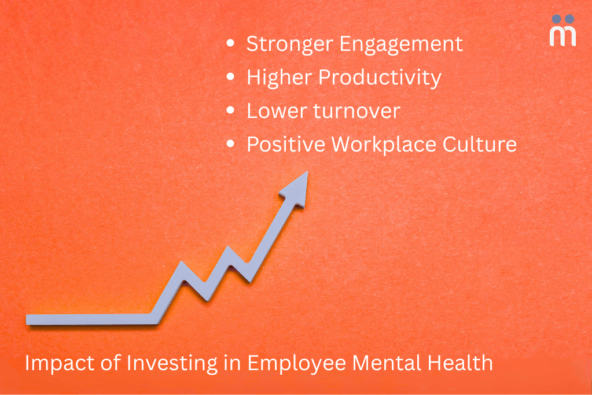
A well-supported workforce is a productive workforce. Mental health issues such as anxiety, depression, and stress can significantly impact an employee’s performance, productivity, and engagement levels. When employees feel supported, they are more likely to feel motivated, remain committed to their roles, and contribute positively to the company culture.
On the other hand, employees who are struggling with mental health issues but feel they have no safe space to discuss or manage their struggles are more likely to become disengaged, take more sick days, or even leave the company altogether.
In fact, a study by Deloitte found that for every £1 spent on mental health initiatives, businesses saw a return of £5 in improved productivity, reduced absenteeism, and lower employee turnover. It’s clear that investing in mental health isn’t just good for your team—it’s good for the success of your business.
While awareness around mental health has increased, stigma and misconceptions still exist in many workplaces. However, the narrative is changing, and more companies are realising that a proactive approach to mental health not only boosts employee morale, creates resilience and flexibility in the workplace but also enhances long-term performance.

In the UK, employers have a legal duty to protect the mental health of their employees under the Health and Safety at Work Act 1974, which requires employers to assess risks to mental health just as they would physical health.
If an employee is facing mental health challenges, businesses need to ensure appropriate risk assessments are done, occupational health support is offered where required, and reasonable adjustments are made, which could include flexible working, altered responsibilities, or a temporary change in workload.
Training Mental Health First Aiders to provide onsite/company support can also be beneficial.
While this legal framework exists, many businesses are still in the process of developing proactive strategies to genuinely support mental health. This is where leaders come in.
Foster a culture where employees feel comfortable discussing mental health without fear of stigma or discrimination. Encourage managers to be open to conversations about mental well-being and to show empathy when employees express concerns, but also encourage employees to develop resilience and take proactive steps to support their own well-being too.
Many companies now offer Employee Assistance Programmes, which provide confidential support services for personal or work-related problems. Offering access to counselling or mental health resources can be a game-changer for employees who need help but might not otherwise seek it out, or want to seek it out with their team members/manager. The ability to access something confidentially can be appealing and reassuring.
Managers play a crucial role in identifying signs of mental health struggles and providing support to their teams. Training managers to recognise mental health issues and respond appropriately (with empathy and sensitivity) is essential. This can include active listening skills, knowing when to escalate issues, and being aware of workplace stressors. Carrying out stress risk assessments or wellbeing assessments are a good tool. Managers do also need to recognise that they aren’t medical professionals and escalating to appropriate medical support or sign-posting to relevant resources is important, training will help them know how to balance this.
As highlighted in our previous blog post on back-to-the-office policies, flexibility in working hours, location, and workload can help employees maintain a healthy work-life balance. It’s important that organisations continue to support and refine these policies, ensuring they are inclusive and accessible to all employees.
Encourage employees to take regular breaks, use their annual leave, and disconnect from work after hours. Regular time off is essential for mental recovery and reducing burnout. Employers can promote this by setting a good example at the top levels of the company and not encouraging or fuelling a long hours culture, or a never switched off culture.
Offer wellness programmes that focus on physical and mental health. This could range from yoga classes to stress management workshops, to encouraging employees to use their lunch breaks to step outside and get some fresh air. Small wellness initiatives can make a big difference.
Implement regular check-ins with employees, especially those in high-stress roles or experiencing noticeable changes in behaviour. These can be informal conversations designed to gauge well-being and offer support when needed. Having someone who listens and provides support can go a long way in preventing more serious mental health issues down the line.
HR has a unique opportunity to champion mental health within an organisation and train and support leaders and managers to look after their employees. By proactively creating a supportive culture and advocating for policies that prioritise well-being, HR leaders can improve not only individual employee health but also leadership development and company-wide productivity.
Steps Companies Can Take:


Investing in mental health is not just a nice-to-have — it’s a must. For both employees and employers, prioritising mental health can lead to stronger engagement, higher productivity, lower turnover, and an overall more positive workplace culture.
Business leaders must continue to advocate for and lead initiatives that support mental well-being, create psychologically safe environments, and provide employees with the resources they need to thrive. When mental health is supported, the benefits extend beyond the individual to the entire organisation.
Remember, the health of your employees is the health of your business.
